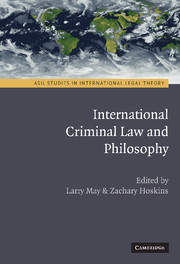Book contents
- Frontmatter
- Contents
- List of Contributors
- Introduction
- PART ONE SOVEREIGNTY AND UNIVERSAL JURISDICTION
- PART TWO CULTURE, GROUPS, AND CORPORATIONS
- PART THREE JUSTICE AND INTERNATIONAL CRIMINAL PROSECUTIONS
- PART FOUR PUNISHMENT AND RECONCILIATION
- 10 The Justification of Punishment in the International Context
- 11 Political Reconciliation and International Criminal Trials
- Index
- References
10 - The Justification of Punishment in the International Context
Published online by Cambridge University Press: 19 January 2010
- Frontmatter
- Contents
- List of Contributors
- Introduction
- PART ONE SOVEREIGNTY AND UNIVERSAL JURISDICTION
- PART TWO CULTURE, GROUPS, AND CORPORATIONS
- PART THREE JUSTICE AND INTERNATIONAL CRIMINAL PROSECUTIONS
- PART FOUR PUNISHMENT AND RECONCILIATION
- 10 The Justification of Punishment in the International Context
- 11 Political Reconciliation and International Criminal Trials
- Index
- References
Summary
INTRODUCTION
Since the Nuremberg trials, the United Nations (UN) has taken steps to bring criminal violators of international law to trial in various forums. Special tribunals were established for the conflicts in former Yugoslavia and Rwanda, and the UN has also exerted pressure on national governments to try these violators, as in East Timor. In 1998, a permanent court, the International Criminal Court (ICC), was established by a treaty signed by 105 nations. The crimes that fall under the ICC's jurisdiction are genocide, crimes against humanity (specific acts such as torture performed in the context of systematic or widespread attacks on a civilian group), war crimes, and the crime of aggression. The ICC's jurisdiction is complementary; that is, it steps in only where the domestic government is unable or unwilling to prosecute. The court has so far opened investigations in Uganda, Congo, Darfur, and Central African Republic.
There are reasons for thinking that the justification for punishing offenders convicted by the ICC is especially strong. The crimes of which these offenders are convicted are in general qualitatively more serious than their domestic counterparts. Such crimes are vastly more serious than ordinary crimes; they directly affect many more individuals, and their effects on the communities in which they occur are far deeper and more lasting.
Just as we might think that the justification for punishing first-degree homicide is stronger than that for punishing shoplifting, we are likely to think that the justification for punishing mass homicide for purposes of ethnic cleansing is stronger than that for punishing garden variety homicide.
- Type
- Chapter
- Information
- International Criminal Law and Philosophy , pp. 201 - 223Publisher: Cambridge University PressPrint publication year: 2009



